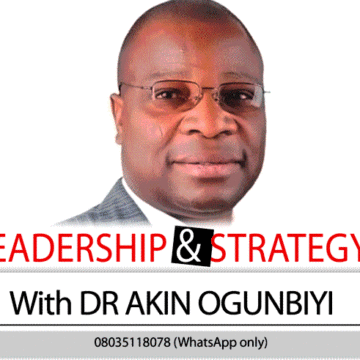
Synonyms of value include worth, price, cost, valuation, rate, fee, estimate, appraisal, evaluation, estimation, assessment, charge, face value and unit price.
A leader’s personal set of values impacts his actions, decisions and behaviour. These values drive the leader and an articulation of this hierarchy (of values) will help us determine whether he is a multiplier or diminisher of profitability and growth in an organization. In other words, one can ask, are the leader’s values compatible or working against the goals and objectives of the organization.

In a profitability analysis, operation concerns, shortfalls and challenges, can be detected from the hierarchy of values or operations’ characteristics.
Today, in this column we want to ask ourselves: how effective is your organization’s sales culture? How is the leader adapting the team to the desired selling behaviour in order to achieve maximum sales’ potentials? Is the sales team solution-focused? Do you practice goal-oriented sales? Is the leader building high-performance sales teams with best practices?
Some lessons and helpful insights for leaders before we continue. Leaders must not squeeze out productivity from their teams through their actions and inactions. We must not flip accountability. Leaders must “serve” the workforce so that they can do their best and give customers their best. Helping your employees is helping your customers because the two parties are intrinsically linked together.
Inspiration is one of the primary goals of excellent people leadership. Achieving success is inspiring the sales team to greater heights. You must teach skills but not manipulative or contrived skills. Teach contemporary modern sales skills. There must be honest relationship with customers and you must motivate prospects to, from time to time, go to the next step.
It is not just the numbers. How much is that deal worth? What is the profit percentage? Organisations deliver value to customers, which is the service they provide. Organisations impact lives significantly by their values. Sales professionals represent the values of products and services.
It is not just what is in the sales funnel and when it will “close” and turn to inflows. Organisations’ values are bigger than the prices and premiums they charge.
Leaders must coach salesmen on skills and not just the sales cycle analogies. Let your sales force run you through their experience so that they can be better at the skills they use. Disrupting their flow when they are explaining and demonstrating can be belittling and discouraging. It deflates them. Coach the sales team to be better at the skills they use. Allow them to make the calls, make the presentations and handle the meetings.
The sales team should be focused to always bond together and strive “collaboratively” to achieve goals. Individuals practicing the agile scrum in sales, should always touch base with team members while maintaining their daring methods of growing results and achieving sales goals. Who dares, wins, is the big driver. Leaders should challenge the goals and opportunities with leading metrics.
Leaders must entrench the right methodology and execution with value selling framework. A gold standard for driving revenue and creating lifetime customers is to align sales, marketing, customer success around the revenue driving engine. As I said earlier, there must be regular reinforcement and coaching for those in the value zone (we will discuss the value zone and the win-win value zone in future). It is very important that there is adoption on value selling across the entire organization. Desired selling behaviours must be achieved through practical demonstration, learning (formal and informal), storytelling and role plays.
Selling methods must be unique. In the value-delivering organisation, people with varying sets of skills and experience are, on a daily basis, working together to deliver frictionless customer experience and achieve differentiated user experience. So, the sales process must never be a one-size-fits-all initiative.
There are best practices for building high-performance sales teams. Sales must be driven by a common vision. There must be entire top management’s commitment, across the board transparency and adaptive context setting. Do not just adopt a once-in-a-while strategic training and learning. We must dedicate resources to adequately and effectively oil the engine of sales. A day-to-day training environment should be created so that desired selling behaviors become habits. We must internalize job mentoring. Adopt the train-the-trainer approach and use tools such as empowering talks, formal and informal beam meetings, sales videos and webinars.
A key component of the reaching-to-the-utmost-top efforts is the incorporation of appropriate metrics in order to achieve clarity on, not only effectiveness, but also building the “perfect” sales culture. There must be qualitative and quantitative criteria on sales volume and units of growth as well as new accounts. We should have qualitative criteria on attitude, product knowledge (from users’ benefits point of view) communication skills, personal appearance, customer feedbacks, selling skills and personal initiatives. We must also differentiate between attitude and aptitude.
Do you know that there are power-selling assets? These assets include being solution-focused in your sales methodology. Also, you must be ethical, a listener and learner, industrious, neighbourly and goal-oriented. The solution-focused sales professional is an expert in providing solutions. He solves customers’ problems. The ethical salesperson maintains the highest ethical standards and therefore, earns the trust of customers. Listeners do most of listening, not talking. The sales man-learner is dedicated to lifelong learning. He craves for latest knowledge on customer needs, market trends and his industry’s best practices. He daily improves his communication methods, negotiation and presentation skills. The neighbourly sales professional is thoughtful, helpful, supportive and always encouraging prospects and customers. While the industrious one is hardworking, diligent and never surrenders nor quits.
Let me conclude with this insight. People in the marketing mix ultimately determine sales success. For instance, employees provide customer service which directly impacts the customers and users’ experience and thereby, influence purchasing decisions.
READ ALSO: Bode George to Sanwo-Olu: Regulate street trading, don’t treat traders like criminals







